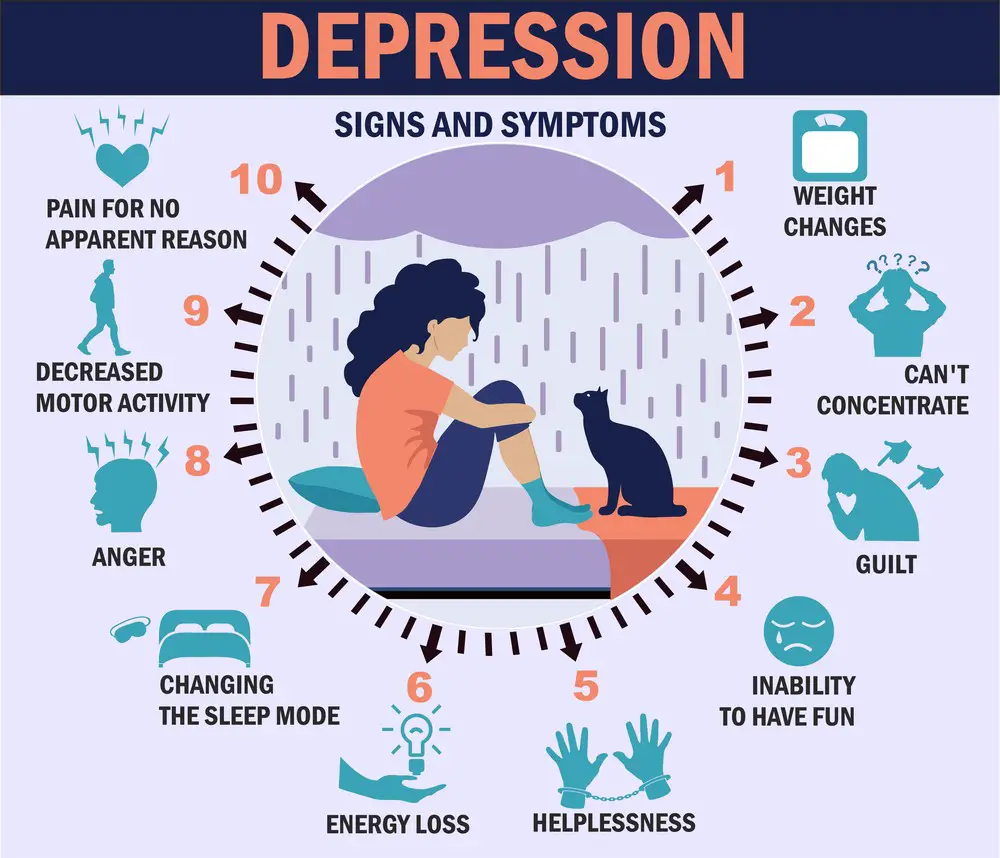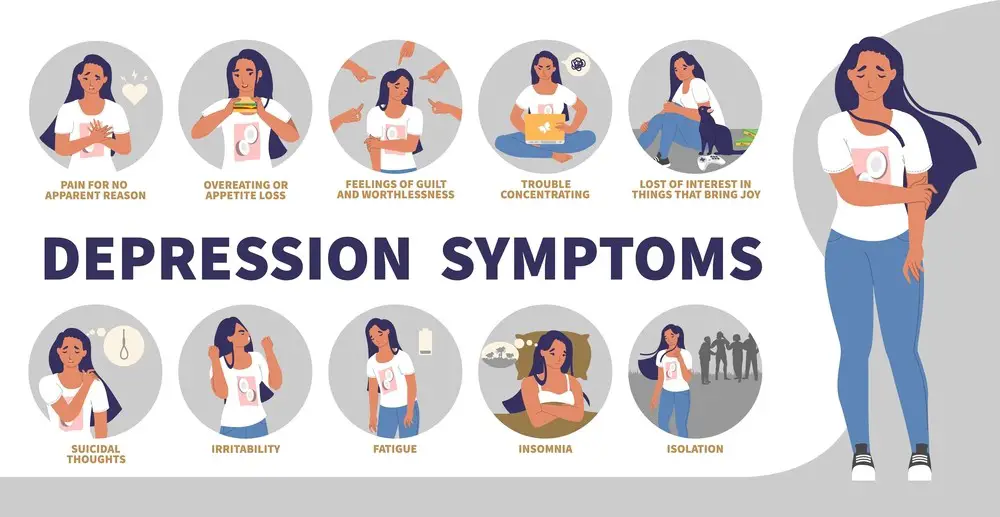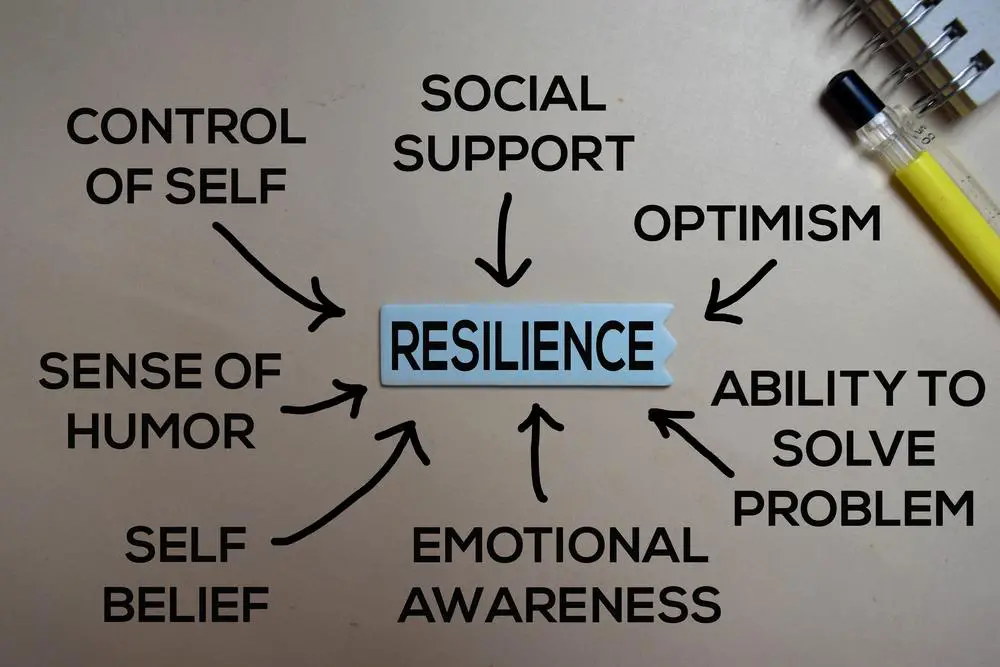As a BetterHelp affiliate, we receive compensation from BetterHelp if you purchase products or services through the links provided
If you’re a stay-at-home mom, you might be familiar with the feeling of being on an emotional rollercoaster. It’s not all playdates and Pinterest-worthy craft sessions; some days, it can feel like you’re stuck in a loop of diapers, dishes, and daytime TV, all while grappling with a sense of isolation that doesn’t quite match up with the dream of motherhood you had in mind. This disconnect can be more than just the blues—it can be stay-at-home mom depression, a genuine and often overlooked struggle.
Tackling this head-on means recognizing the signs and admitting that, yes, it’s tough and, no, you’re not failing at being a mom. In this post, we will talk about some honest-to-goodness strategies that can help you move from just surviving to thriving. So, if you’re feeling like you’re constantly on the verge of tears when you’re supposed to be savoring every moment, know that you’re not alone and that it’s okay to seek help.
Here’s what we’ll dive into:
- Acknowledging the Struggle: Giving yourself permission to feel and say, “This is hard.”
- Creating Community: How to forge connections when you’re feeling isolated.
- Finding Fulfillment: Carving out time for yourself and rediscovering your identity beyond motherhood.
- Seeking Support: The importance of reaching out for professional help when needed.
It’s time to talk about the tough stuff and find ways to lift the fog. Let’s get real about what it means to be a stay-at-home mom and how to find your footing when the ground beneath you feels shaky.
Key Takeaways:
- It’s Real: Stay-at-home mom depression isn’t just a case of Mondays; it’s a genuine challenge that needs attention.
- You’re Not Alone: There’s a whole tribe of moms out there who get it and are ready to support you.
- Help is Out There: There’s no shame in reaching out for professional guidance—it’s a sign of strength.
- Self-Care is Essential: Finding time for yourself isn’t selfish; it’s necessary for your well-being.
- Small Steps: Small, daily actions can lead to big changes in your mental health and overall happiness.

In this article, we will explore the concept of stay-at-home mom depression, define it, and shed light on the signs and symptoms that often go unnoticed. Coping strategies, self-care tips, seeking support, and the importance of professional help will be discussed to help stay-at-home moms navigate this difficult journey.
Furthermore, we will delve into the importance of balancing motherhood with mental health professional self-care and discuss the process of self-harm, healing, and recovery.
Understanding Stay-at-Home Mom Depression
Defining Stay-at-Home Mom Depression
Stay-at-home mom depression and its unique challenges.
Stay-at-home mom depression is a specific form of depression that can affect women who have chosen to stay at home to care for their children.
The unique challenges in this role for other parents include social isolation, a lack of adult interaction, monotony, and the absence of personal time. These factors can contribute to the development of depressive symptoms and mental disorders in other adults.
The role of a stay-at-home mom can contribute to depression.
The role of a stay-at-home mom often involves a heavy workload, endless responsibilities, and limited opportunities for self-care.
The constant juggling of childcare, household chores, and other duties can lead to chronic stress, emotional exhaustion experience depression, and feelings of being overwhelmed feel isolated. These challenges can contribute to the development of depression.
 Recognizing the Signs
Recognizing the Signs
The common signs and symptoms of depression in stay-at-home moms.
Recognizing the signs of depression, especially as a stay-at-home mom, can be a bit tricky. You’re in a unique situation where your daily environment doesn’t change much, and your tasks can be pretty repetitive. So, it’s essential to tune into your feelings and be honest about what’s going on inside.
Here’s a breakdown of what to watch out for:
- Persistent Sadness: The blues have moved in, and they’re not packing up. It’s like a gray cloud hanging around, dampening your days.
- Irritability That Sticks: Little things get under your skin in a big way, and that short fuse isn’t getting any longer.
- Never-Ending Exhaustion: Even when you get a good night’s sleep (if you can manage that), you might still feel like you’re running on empty.
- Eating Habits Change: Whether it’s “I’m not hungry” or “I can’t stop eating,” your relationship with food isn’t what it used to be.
- Sleep Just Isn’t the Same: You might be tossing and turning all night, or maybe you want to sleep all day. Either way, your bed’s seen better days.
- Joy Seems to Have Jogged Off: The hobbies and activities you used to love don’t spark joy anymore. It’s like your “happy” got up and went without leaving a note.
- Guilt and Hopelessness Make Themselves at Home: There’s this nagging feeling that you’re not doing enough, paired with a sense that things might not get better.
- Feeling Worthless: Despite all you do, you might feel like it’s never enough like you’re failing at motherhood and everything else.
- Scary Thoughts: If thoughts of harming yourself or worse start creeping in, it’s a big, flashing sign that you need to reach out for help immediately.
- Foggy Brain: Making decisions or focusing on anything becomes a Herculean task.
If these symptoms are all too familiar, it’s time to pause and acknowledge that you might be dealing with depression. Remember, acknowledging the problem is the first, brave step toward healing. It’s not about finding a quick fix; it’s about starting a journey towards a happier, healthier you. And that’s something worth fighting for.
Why recognizing these signs is essential?
Recognizing the signs of depression is crucial because early intervention and treatment can prevent the condition from worsening. It’s essential for working parents to understand that experiencing depression does not make someone a lesser parent; seeking help is a positive and courageous step toward healing.
 Coping Strategies
Coping Strategies
Self-Care for Stay-at-Home Moms
The importance of self-care in managing depression.
Self-care is a vital component of managing depression as a stay-at-home mom. It involves setting aside time for activities that promote mental, emotional, and physical well-being. Taking care of oneself allows for better resilience, other mental health issues, and a more positive outlook on everyday life too.
Self-care tips for stay-at-home moms.
Self-care isn’t just a buzzword—it’s your lifeline, especially when you’re a stay-at-home mom. You’re on duty 24/7, and it’s easy to lose yourself in the needs of your family. But remember, taking care of yourself isn’t a luxury; it’s a necessity. Here’s how you can inject some self-care into your routine without feeling like you’re just piling more onto your to-do list:
- Claim Your ‘Me Time’: Seriously, schedule it. Whether waking up 30 minutes before everyone else to sip coffee in silence or a quick walk alone after dinner, make that time non-negotiable.
- Move Your Body: Exercise isn’t just about fitness—it’s a mood lifter. A dance party during your kids’ naptime or a yoga app can do wonders.
- Connect with Adults: Have real, grown-up conversations. A quick chat with a friend can remind you of a world beyond kid-talk.
- Pick Up a Hobby: Rediscover an old passion or find a new one. Something that’s just for you doesn’t involve being “Mom.”
- Laugh a Little (or a Lot): Watch a comedy, read a funny book, or have a giggle session with your kids. Laughter really can be the best medicine.
- Get Outdoors: Fresh air and a change of scenery can work magic on your mood. Walking around the block can break up the day and lift your spirits.
- Healthy Bites: Try to eat foods that fuel your body and mind. Good nutrition can have a big impact on how you feel.
- Rest Up: Sleep is tough with kids, I know. But try to make quality sleep a priority. Even a 20-minute power nap can recharge your batteries.
- Mindfulness Moments: Meditation, deep breathing, or being present can reduce stress. There are great apps to guide you if you’re new to it.
- Ask for Help: It’s okay to need a break. Swap playdates with a friend or look into a part-time sitter. There’s no award for doing it all alone.
Remember, you can’t pour from an empty cup. Taking care of yourself isn’t just the best thing for you—it’s the best for your kids, too. They need a happy, healthy mom who feels whole. So, start small, be consistent, and watch how these little acts of self-care make a big difference in your life.
 Seeking Support
Seeking Support
The significance of seeking emotional and social support.
Emotional and social support is invaluable for stay-at-home and working moms dealing with depression. Talking about one’s feelings, needs, and concerns with trusted friends, family members, or support groups can provide comfort and understanding.
Ways to connect with support networks.
Stay-at-home moms can connect with support networks through online communities, local parenting groups, or therapy services. Seeking professional help, joining playgroups, or attending parenting classes can also offer new moms valuable social connections and emotional support from other moms.

Healing and Recovery
Professional Help and Therapy
Therapy and counseling in treating stay-at-home mom depression.
Therapy and counseling can be highly effective in treating stay-at-home mom depression. These therapeutic interventions provide a safe space for exploring feelings, developing coping strategies, and identifying the root causes of depression. Cognitive-behavioral therapy (CBT) and interpersonal therapy are commonly used approaches.
How to find a suitable therapist?
Finding a suitable therapist involves researching local mental health professionals, checking reviews and qualifications, and arranging initial consultations to ensure family therapy is a good fit for everyone. Online therapy services can also be a convenient option for stay-at-home moms.
 Building Resilience
Building Resilience
Strategies for building emotional resilience and mental strength.
It’s important to develop emotional resilience and mental strength to better cope with life’s challenges. This involves establishing healthy coping mechanisms, having realistic expectations, and practicing self-compassion. For stay-at-home moms, resilience can be particularly useful in managing the difficulties of their role.
Focus on personal growth and well-being.
To focus on personal growth and well-being, it’s vital to set personal goals, pursue hobbies and interests, and consistently prioritize emotional and mental health. Recognizing the importance of personal growth and wellness can also contribute to overall happiness and positively impact one’s parenting journey.
Achieving emotional resilience and mental strength is like building a fortress. It’s not about being invulnerable but becoming strong enough to handle life’s challenges without falling apart. Here are some strategies that can help you fortify your emotional and mental well-being:
- Embrace Your Feelings: It’s okay to have a good cry or feel frustrated. Recognize your emotions, name them, and understand they’re part of the human experience. Bottling up feelings often leads to a more enormous emotional explosion later.
- Set Boundaries: Learn to say no. It’s not selfish; it’s self-preservation. Boundaries keep you from overcommitting and becoming overwhelmed.
- Practice Gratitude: Take time each day to reflect on what’s going well. Keeping a gratitude journal can shift your focus from what’s draining to filling.
- Cultivate Optimism: Look for the silver lining. It’s not about ignoring the negative but choosing to see challenges as opportunities for growth.
- Develop Problem-Solving Skills: When issues arise, break them down into manageable steps. Finding solutions, even small ones can give you a sense of control and accomplishment.
- Seek Out Support: Connect with friends, family, or support groups. Just talking about what you’re going through can lighten your load.
- Take Breaks: Regular breaks are essential. A little downtime can recharge your mental batteries and reduce stress.
- Stay Present: Practice mindfulness or meditation to stay grounded here and now. This can help prevent anxiety about the future or rumination on the past.
- Foster Connections: Build strong, positive relationships. Having a supportive network can provide a buffer against life’s stressors.
- Laugh and Have Fun: Joy and humor are powerful antidotes to stress. Make sure to include activities in your life that make you happy.
- Learn to Let Go: Some things are beyond your control. Focus on what you can change, and try to accept what you can’t.
Remember, resilience is not only innate; it’s something you build—every step you take to look after your emotional health is like adding a brick to your fortress. Over time, you’ll find that you’re better equipped to deal with the challenges of being a stay-at-home mom, and you’ll be teaching your kids by example how to build their emotional strength.

Balancing Motherhood and Self-Care
Balancing the demands of motherhood with the need for self-care is a bit like trying to find the perfect temperature in the shower – too much of one and you’re either freezing or getting burned. But with some intentional steps, you can find that just-right balance.
Here’s how to strike that delicate equilibrium:
- Communicate Openly: Chat with your partner or support system about your self-care needs. When they understand it’s a priority for your well-being, they’re more likely to support you.
- Plan Together: Sit down with your partner or family and look at the schedule. Find gaps where you can carve out time for yourself, and ask for their help to cover those slots.
- It’s a Family Affair: Get the kids involved in understanding self-care. Even young children can learn the importance of everyone having time to recharge, including mommy.
- Quality over Quantity: Your self-care doesn’t need to be a weekend retreat (although that’s nice). Even 15 minutes of reading, a quick walk, or a solo coffee run can do wonders.
- Release the Guilt: Remember that self-care isn’t selfish; it’s essential. You’re setting an example for your children about the importance of taking care of oneself.
- Be Efficient: Can you combine self-care with family time? Yoga with the kids, a dance-off while doing chores, or a family walk can be both bonding and rejuvenating.
- Flexible Routines: While routines are helpful, be prepared to adapt. If your planned self-care time falls through, look for another opportunity instead of skipping it entirely.
- Delegate: You don’t have to do it all. Delegate tasks to your partner or older children. It’s good for them and for you.
- Stay Organized: Keep a shared family calendar. When everyone knows what’s happening and when it’s easier to see where self-care slots in.
- Early Bird or Night Owl: If your day is chock-full of child-centric activities, consider using the early morning or late evening when the kids are asleep for some me-time.
Finding balance is about making small adjustments that add up to big benefits. By involving your family in the process and integrating self-care into your daily life, you’ll find that looking after yourself becomes a natural part of your routine, not a sporadic luxury. And as you become more fulfilled, you’ll likely find that you’re also becoming the kind of joyful, present parent you aspire to be.
Conclusion
In conclusion, stay-at-home mom depression is a significant and often overlooked issue that can affect maternal mental health.
Recognizing the signs of postpartum depression, practicing self-care, seeking support, and considering professional help are crucial steps toward healing and recovery. By prioritizing mental health issues, stay-at-home moms can find greater fulfillment in their roles and better navigate the unique challenges they face.
Frequently Asked Questions

What is stay-at-home mom depression?
It’s a form of depression that can occur in moms who stay at home to care for their children. It involves persistent sadness, worthlessness, and loss of interest in activities, among other symptoms.
Can being a stay-at-home mom lead to depression?
Yes, the role of a stay-at-home mom can lead to depression due to the unique challenges, social isolation, spending time alone, and overwhelming responsibilities associated with this role. Recognizing the signs of depression symptoms and seeking support is essential.
How can I talk to my partner or loved ones about my depression as a stay-at-home mom?
Approaching your partner or loved ones about your depression can be challenging, but is essential for getting the support you need.
Choose a time to talk when you can have their full attention, express your feelings honestly, and let them know how they can support you. Encourage open communication and seek their understanding and empathy.
Is it common for stay-at-home moms to feel depressed?
Yes, many stay-at-home moms experience feelings of depression due to isolation, loss of identity, and the relentless demands of parenting.
How can I tell if I’m experiencing stay-at-home mom depression or just a rough patch?
If feelings of sadness, hopelessness, or overwhelm are persistent and interfere with your daily life, it may be depression. It’s always best to consult with a healthcare professional for an accurate diagnosis.
What are some strategies for coping with stay-at-home mom depression?
Strategies include establishing a routine, connecting with other adults, finding time for hobbies or interests, exercising, and seeking professional help if needed.
How can I find time for self-care as a stay-at-home mom?
Schedule it like any important appointment, ask for help with childcare, and find creative ways to incorporate self-care into your day, even if it’s just a few minutes at a time.
Can talking to other stay-at-home moms help?
Yes, connecting with others who understand your situation can provide emotional support and may also offer practical advice and coping strategies.
Should I feel guilty for needing time away from my children?
Not at all. Taking time for self-care is essential for your well-being and can make you a more patient and happy parent.
What should I do if self-care and coping strategies aren’t helping?
If you’ve tried self-care and coping strategies and you’re still struggling, it’s important to seek help from a mental health professional.
Are there support groups for stay-at-home moms experiencing depression?
Yes, there are both in-person and online support groups for stay-at-home moms dealing with depression. These can be a great resource for support and advice.
How can a partner or family member support a stay-at-home mom who is dealing with depression?
They can offer emotional support, help with childcare, encourage her to take time for herself, and be involved in seeking professional help if necessary.
Remember, these FAQs are a starting point. Each individual’s experience with depression is unique, and it’s important to seek personalized advice from a healthcare provider.
- Left Arm Pain and Anxiety: Understanding the Relationship - November 23, 2023
- Anxiety Paralysis: Coping with Overwhelming Stress - November 23, 2023
- Anxious vs. Nervous: Differentiating Emotions and Responses - November 15, 2023
This site contains affiliate links to products. We will receive a commission for purchases made through these links.


 Recognizing the Signs
Recognizing the Signs Coping Strategies
Coping Strategies Seeking Support
Seeking Support Building Resilience
Building Resilience
